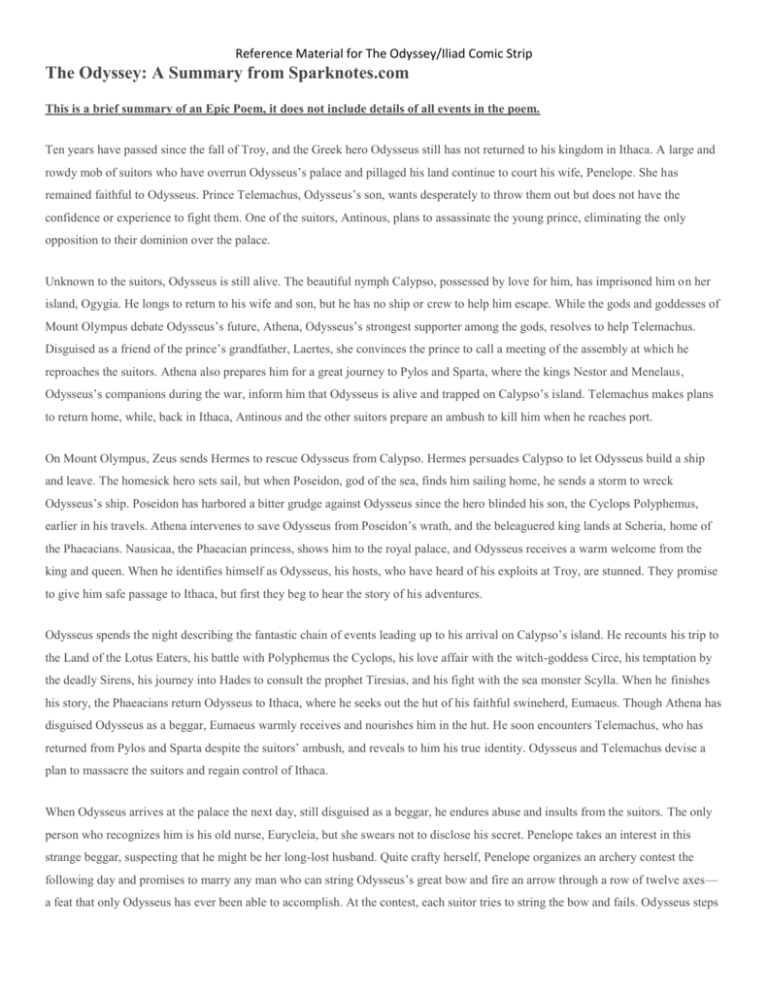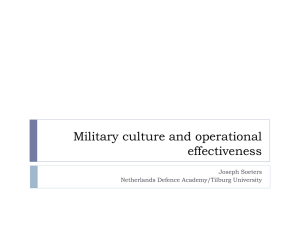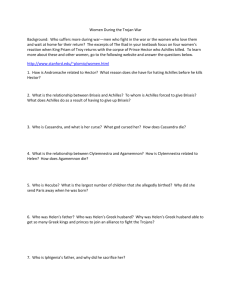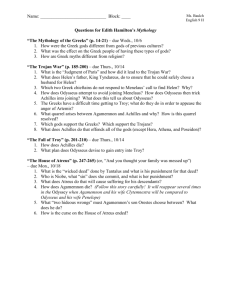The Odyssey/Iliad Source Material
advertisement

Reference Material for The Odyssey/Iliad Comic Strip The Odyssey: A Summary from Sparknotes.com This is a brief summary of an Epic Poem, it does not include details of all events in the poem. Ten years have passed since the fall of Troy, and the Greek hero Odysseus still has not returned to his kingdom in Ithaca. A large and rowdy mob of suitors who have overrun Odysseus’s palace and pillaged his land continue to court his wife, Penelope. She has remained faithful to Odysseus. Prince Telemachus, Odysseus’s son, wants desperately to throw them out but does not have the confidence or experience to fight them. One of the suitors, Antinous, plans to assassinate the young prince, eliminating the only opposition to their dominion over the palace. Unknown to the suitors, Odysseus is still alive. The beautiful nymph Calypso, possessed by love for him, has imprisoned him on her island, Ogygia. He longs to return to his wife and son, but he has no ship or crew to help him escape. While the gods and goddesses of Mount Olympus debate Odysseus’s future, Athena, Odysseus’s strongest supporter among the gods, resolves to help Telemachus. Disguised as a friend of the prince’s grandfather, Laertes, she convinces the prince to call a meeting of the assembly at which he reproaches the suitors. Athena also prepares him for a great journey to Pylos and Sparta, where the kings Nestor and Menelaus, Odysseus’s companions during the war, inform him that Odysseus is alive and trapped on Calypso’s island. Telemachus makes plans to return home, while, back in Ithaca, Antinous and the other suitors prepare an ambush to kill him when he reaches port. On Mount Olympus, Zeus sends Hermes to rescue Odysseus from Calypso. Hermes persuades Calypso to let Odysseus build a ship and leave. The homesick hero sets sail, but when Poseidon, god of the sea, finds him sailing home, he sends a storm to wreck Odysseus’s ship. Poseidon has harbored a bitter grudge against Odysseus since the hero blinded his son, the Cyclops Polyphemus, earlier in his travels. Athena intervenes to save Odysseus from Poseidon’s wrath, and the beleaguered king lands at Scheria, home of the Phaeacians. Nausicaa, the Phaeacian princess, shows him to the royal palace, and Odysseus receives a warm welcome from the king and queen. When he identifies himself as Odysseus, his hosts, who have heard of his exploits at Troy, are stunned. They promise to give him safe passage to Ithaca, but first they beg to hear the story of his adventures. Odysseus spends the night describing the fantastic chain of events leading up to his arrival on Calypso’s island. He recounts his trip to the Land of the Lotus Eaters, his battle with Polyphemus the Cyclops, his love affair with the witch-goddess Circe, his temptation by the deadly Sirens, his journey into Hades to consult the prophet Tiresias, and his fight with the sea monster Scylla. When he finishes his story, the Phaeacians return Odysseus to Ithaca, where he seeks out the hut of his faithful swineherd, Eumaeus. Though Athena has disguised Odysseus as a beggar, Eumaeus warmly receives and nourishes him in the hut. He soon encounters Telemachus, who has returned from Pylos and Sparta despite the suitors’ ambush, and reveals to him his true identity. Odysseus and Telemachus devise a plan to massacre the suitors and regain control of Ithaca. When Odysseus arrives at the palace the next day, still disguised as a beggar, he endures abuse and insults from the suitors. The only person who recognizes him is his old nurse, Eurycleia, but she swears not to disclose his secret. Penelope takes an interest in this strange beggar, suspecting that he might be her long-lost husband. Quite crafty herself, Penelope organizes an archery contest the following day and promises to marry any man who can string Odysseus’s great bow and fire an arrow through a row of twelve axes— a feat that only Odysseus has ever been able to accomplish. At the contest, each suitor tries to string the bow and fails. Odysseus steps Reference Material for The Odyssey/Iliad Comic Strip up to the bow and, with little effort, fires an arrow through all twelve axes. He then turns the bow on the suitors. He and Telemachus, assisted by a few faithful servants, kill every last suitor. Odysseus reveals himself to the entire palace and reunites with his loving Penelope. He travels to the outskirts of Ithaca to see his aging father, Laertes. They come under attack from the vengeful family members of the dead suitors, but Laertes, reinvigorated by his son’s return, successfully kills Antinous’s father and puts a stop to the attack. Zeus dispatches Athena to restore peace. With his power secure and his family reunited, Odysseus’s long ordeal comes to an end. The Iliad: A summary from Sparknotes.com This is a brief summary of an Epic Poem, it does not include details of all events in the poem. Nine years after the start of the Trojan War, the Greek (“Achaean”) army sacks Chryse, a town allied with Troy. During the battle, the Achaeans capture a pair of beautiful maidens, Chryseis and Briseis. Agamemnon, the leader of the Achaean forces, takes Chryseis as his prize, and Achilles, the Achaeans’ greatest warrior, claims Briseis. Chryseis’s father, Chryses, who serves as a priest of the god Apollo, offers an enormous ransom in return for his daughter, but Agamemnon refuses to give Chryseis back. Chryses then prays to Apollo, who sends a plague upon the Achaean camp. After many Achaeans die, Agamemnon consults the prophet Calchas to determine the cause of the plague. When he learns that Chryseis is the cause, he reluctantly gives her up but then demands Briseis from Achilles as compensation. Furious at this insult, Achilles returns to his tent in the army camp and refuses to fight in the war any longer. He vengefully yearns to see the Achaeans destroyed and asks his mother, the sea-nymph Thetis, to enlist the services of Zeus, king of the gods, toward this end. The Trojan and Achaean sides have declared a cease-fire with each other, but now the Trojans breach the treaty and Zeus comes to their aid. With Zeus supporting the Trojans and Achilles refusing to fight, the Achaeans suffer great losses. Several days of fierce conflict ensue, including duels between Paris and Menelaus and between Hector and Ajax. The Achaeans make no progress; even the heroism of the great Achaean warrior Diomedes proves fruitless. The Trojans push the Achaeans back, forcing them to take refuge behind the ramparts that protect their ships. The Achaeans begin to nurture some hope for the future when a nighttime reconnaissance mission by Diomedes and Odysseus yields information about the Trojans’ plans, but the next day brings disaster. Several Achaean commanders become wounded, and the Trojans break through the Achaean ramparts. They advance all the way up to the boundary of the Achaean camp and set fire to one of the ships. Defeat seems imminent, because without the ships, the army will be stranded at Troy and almost certainly destroyed. Concerned for his comrades but still too proud to help them himself, Achilles agrees to a plan proposed by Nestor that will allow his beloved friend Patroclus to take his place in battle, wearing his armor. Patroclus is a fine warrior, and his presence on the battlefield helps the Achaeans push the Trojans away from the ships and back to the city walls. But the counterattack soon falters. Apollo knocks Patroclus’s armor to the ground, and Hector slays him. Fighting then breaks out as both sides try to lay claim to the body and armor. Hector ends up with the armor, but the Achaeans, thanks to a courageous effort by Menelaus and others, manage to bring the body back to their camp. When Achilles discovers that Hector has killed Patroclus, he fills with such grief and rage that he agrees to Reference Material for The Odyssey/Iliad Comic Strip reconcile with Agamemnon and rejoin the battle. Thetis goes to Mount Olympus and persuades the god Hephaestus to forge Achilles a new suit of armor, which she presents to him the next morning. Achilles then rides out to battle at the head of the Achaean army. Meanwhile, Hector, not expecting Achilles to rejoin the battle, has ordered his men to camp outside the walls of Troy. But when the Trojan army glimpses Achilles, it flees in terror back behind the city walls. Achilles cuts down every Trojan he sees. Strengthened by his rage, he even fights the god of the river Xanthus, who is angered that Achilles has caused so many corpses to fall into his streams. Finally, Achilles confronts Hector outside the walls of Troy. Ashamed at the poor advice that he gave his comrades, Hector refuses to flee inside the city with them. Achilles chases him around the city’s periphery three times, but the goddess Athena finally tricks Hector into turning around and fighting Achilles. In a dramatic duel, Achilles kills Hector. He then lashes the body to the back of his chariot and drags it across the battlefield to the Achaean camp. Upon Achilles’ arrival, the triumphant Achaeans celebrate Patroclus’s funeral with a long series of athletic games in his honor. Each day for the next nine days, Achilles drags Hector’s body in circles around Patroclus’s funeral bier. At last, the gods agree that Hector deserves a proper burial. Zeus sends the god Hermes to escort King Priam, Hector’s father and the ruler of Troy, into the Achaean camp. Priam tearfully pleads with Achilles to take pity on a father bereft of his son and return Hector’s body. He invokes the memory of Achilles’ own father, Peleus. Deeply moved, Achilles finally relents and returns Hector’s corpse to the Trojans. Both sides agree to a temporary truce, and Hector receives a hero’s funeral. The Odyssey (Translation) A small translation portion of Book I of The Odyssey In a Council of the Gods, Poseidon absent, Pallas procureth an order for the restitution of Odysseus; and appearing to his son Telemachus, in human shape, adviseth him to complain of the Wooers before the Council of the people, and then go to Pylos and Sparta to inquire about his father. Tell me, Muse, of that man, so ready at need, who wandered far and wide, after he had sacked the sacred citadel of Troy, and many were the men whose towns he saw and whose mind he learnt, yea, and many the woes he suffered in his heart upon the deep, striving to win his own life and the return of his company. Nay, but even so he saved not his company, though he desired it sore. For through the blindness of their own hearts they perished, fools, who devoured the oxen of Helios Hyperion: but the god took from them their day of returning. Of these things, goddess, daughter of Zeus, whencesoever thou hast heard thereof, declare thou even unto us. Now all the rest, as many as fled from sheer destruction, were at home, and had escaped both war and sea, but Odysseus only, craving for his wife and for his homeward path, the lady nymph Calypso held, that fair goddess, in her hollow caves, longing to have him for her lord. But when now the year had come in the courses of the seasons, wherein the gods had ordained that he should return home to Ithaca, not even there was he quit of labours, not even among his own; but all the gods had pity on him save Poseidon, who raged continually against godlike Odysseus, till be came to his own country. Howbeit Poseidon had now departed for the distant Ethiopians, the Ethiopians that are sundered in twain, the uttermost of men, abiding some where Hyperion sinks and some where he rises. There he looked to receive his hecatomb of bulls and rams, there he made merry sitting at the feast, but the other gods were gathered in the halls of Olympian Zeus. Then among them the father of gods and men began to speak, for he bethought him in his heart of noble Aegisthus, whom the son of Agamemnon, far-famed Orestes, slew. Thinking upon him he spake out among the Immortals: Reference Material for The Odyssey/Iliad Comic Strip Translated beginning portion of The Iliad Sing, Goddess, sing of the rage of Achilles, son of Peleus— that murderous anger which condemned Achaeans to countless agonies and threw many warrior souls deep into Hades, leaving their dead bodies carrion food for dogs and birds— all in fulfilment of the will of Zeus. Start at the point where Agamemnon, son of Atreus, that king of men, quarrelled with noble Achilles. Which of the gods incited these two men to fight? That god was Apollo, son of Zeus and Leto. Angry with Agamemnon, he cast plague down [10] onto the troops—deadly infectious evil. For Agamemnon had dishonoured the god’s priest, Chryses, who’d come to the ships to find his daughter, Chryseis, bringing with him a huge ransom. In his hand he held up on a golden staff the scarf sacred to archer god Apollo. He begged Achaeans, above all the army’s leaders, the two sons of Atreus: 10 Assignment: Using this packet as a reference you will create a detailed comic strip (16 frames) that depicts EITHER the Iliad, or the Odyssey. You comic strip must be colored, and have a minimum of 1 sentence in each frame, these sentences can either be characters talking or a descriptive sentence. Example; This comic is 7 Frames, and utilizes both text bubbles and descriptive bubbles. If you do not wish to create a comic strip you may write a 1pg summary of BOTH the Iliad and The Odyssey as an alternative assignment.




